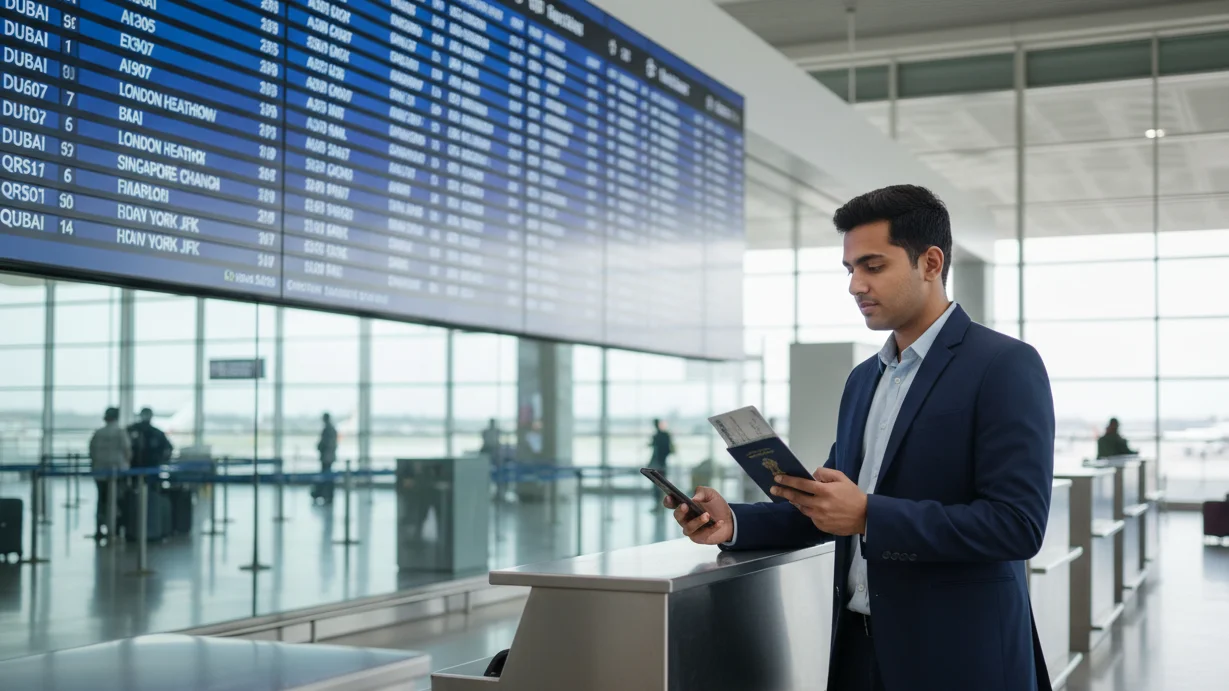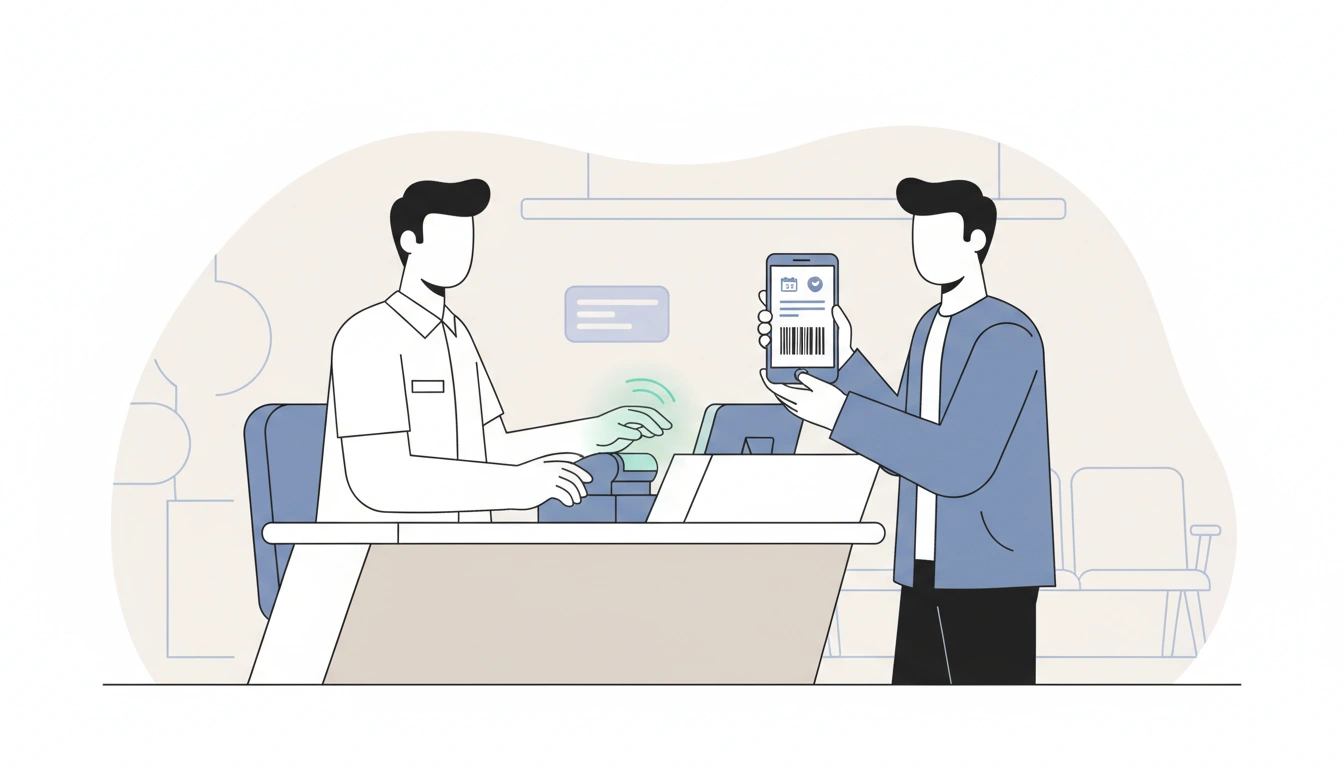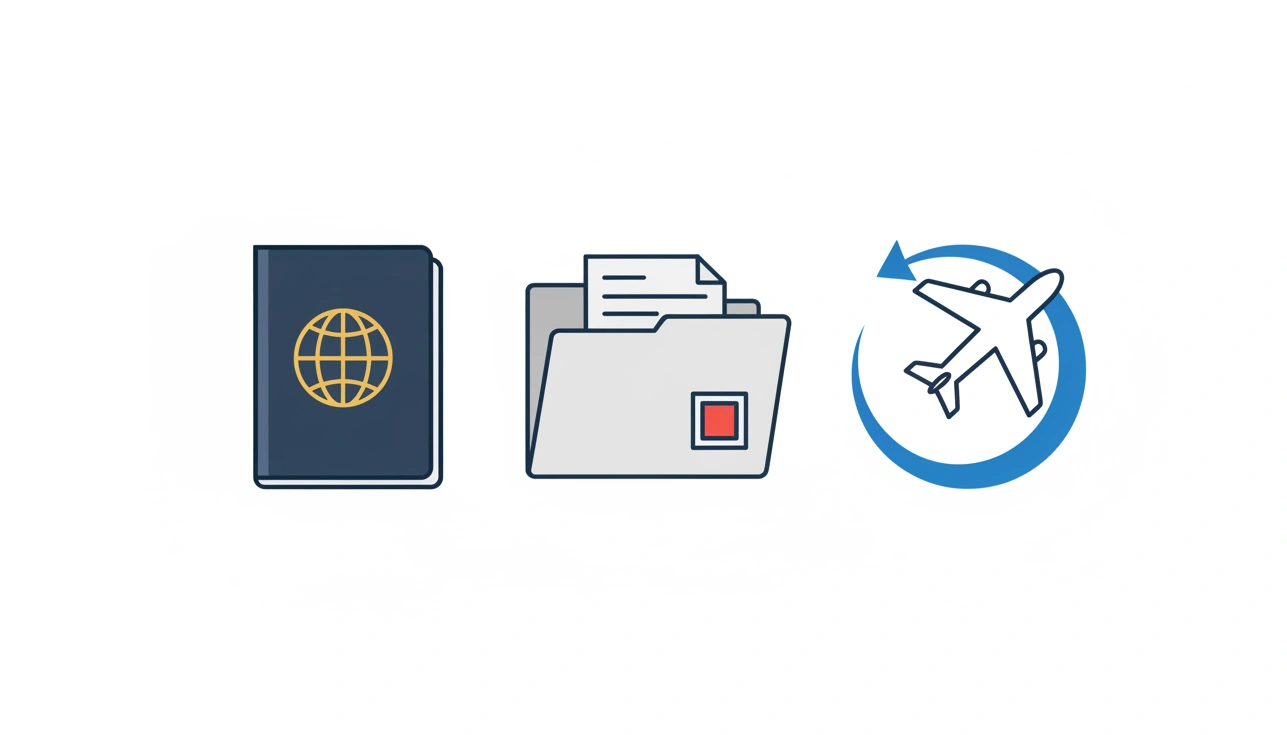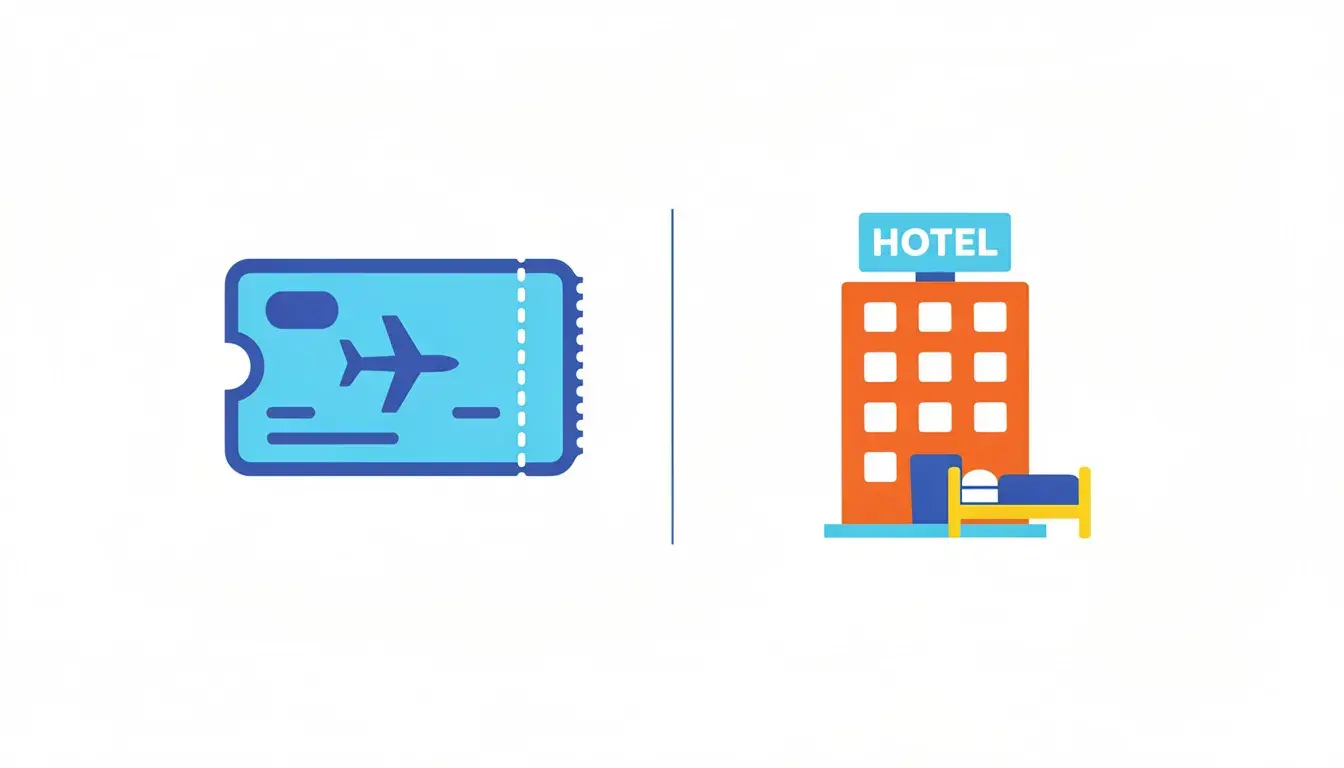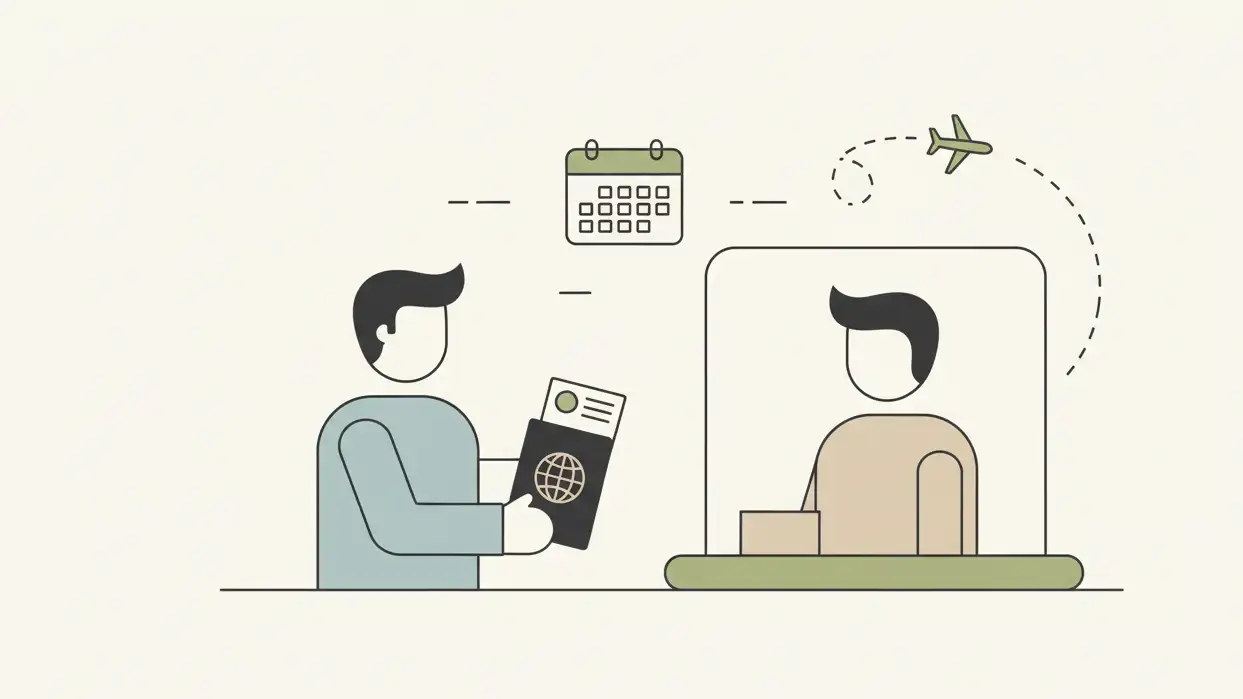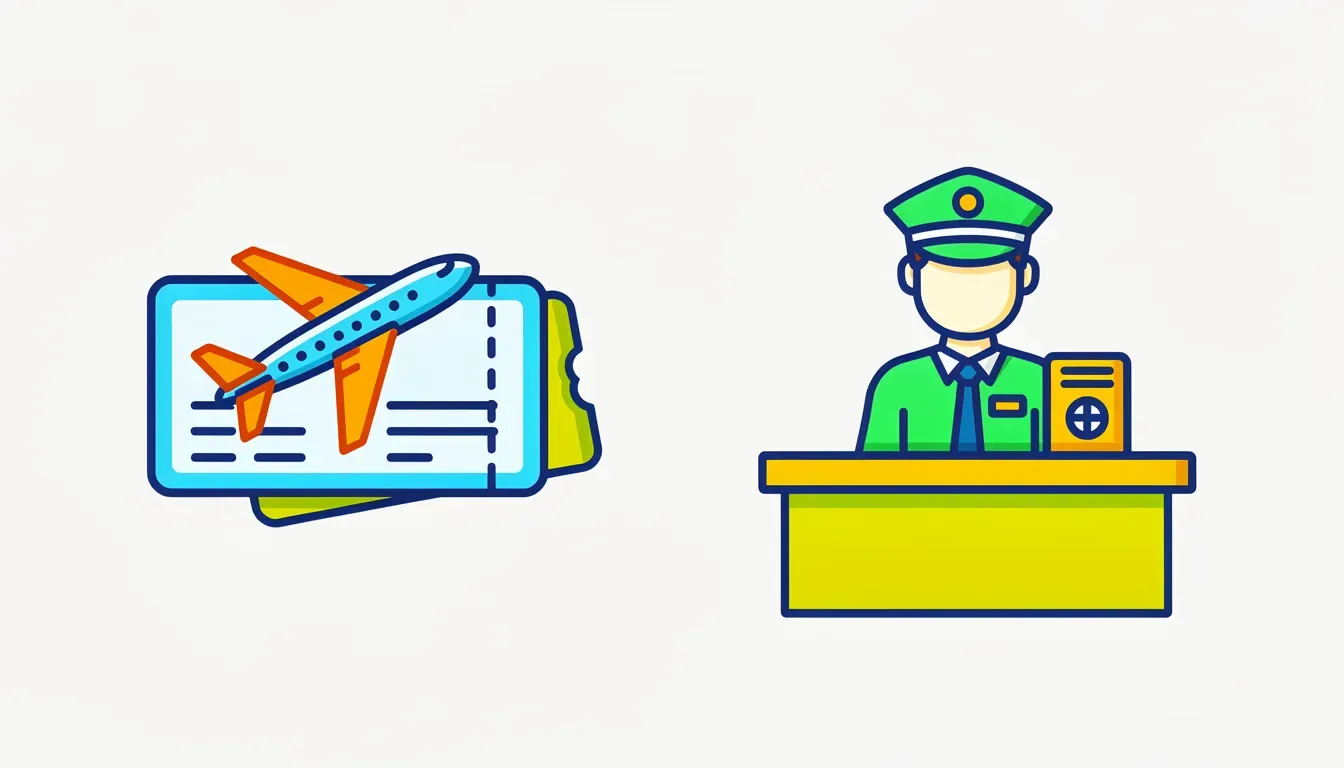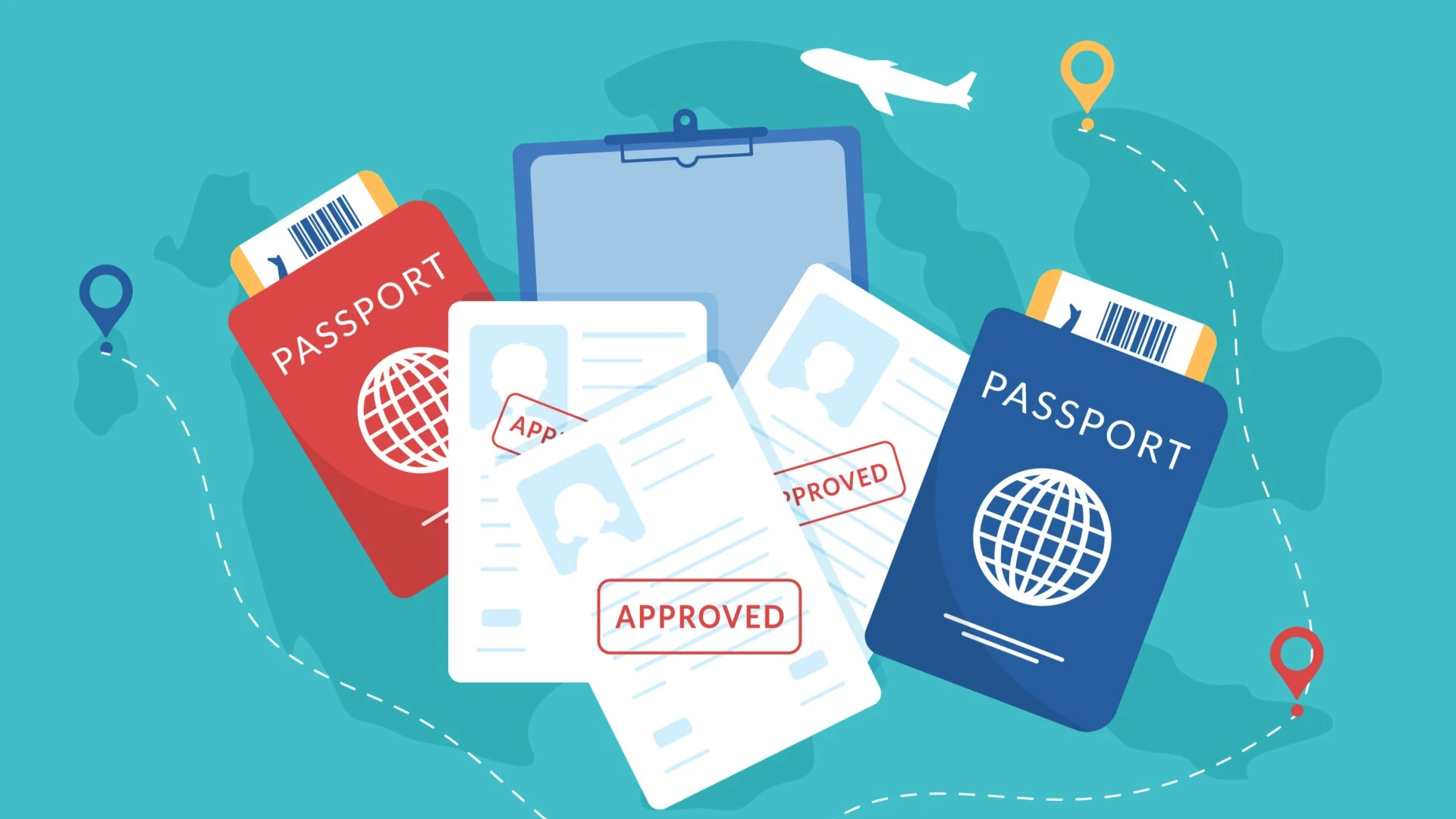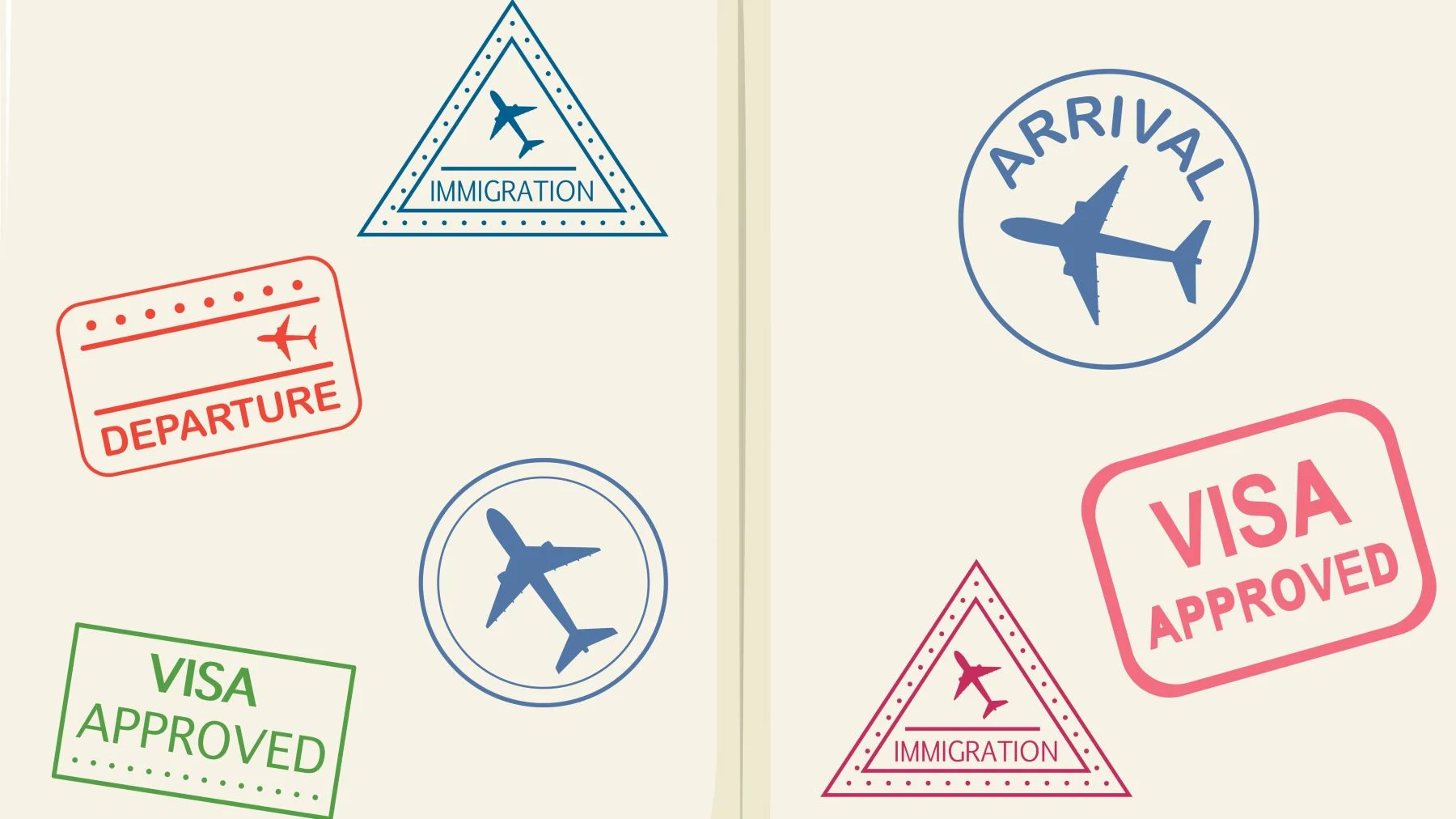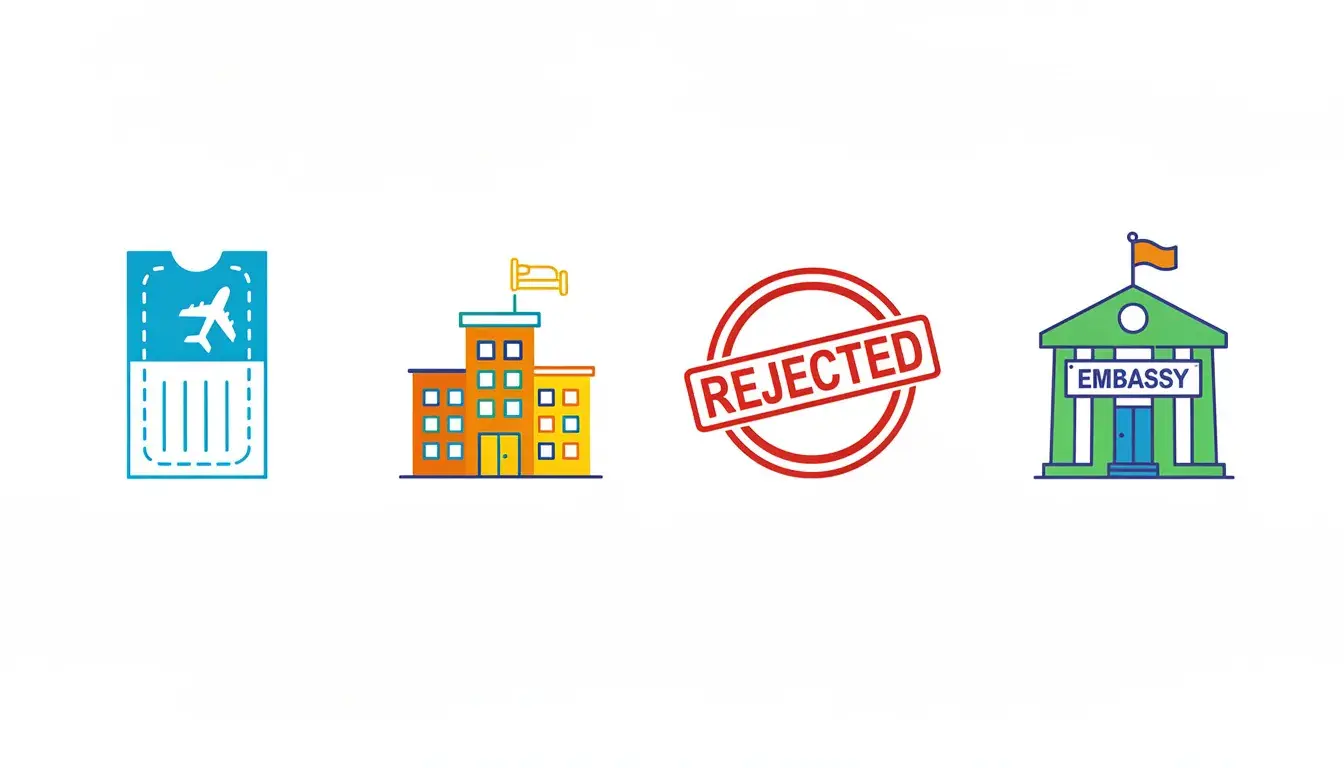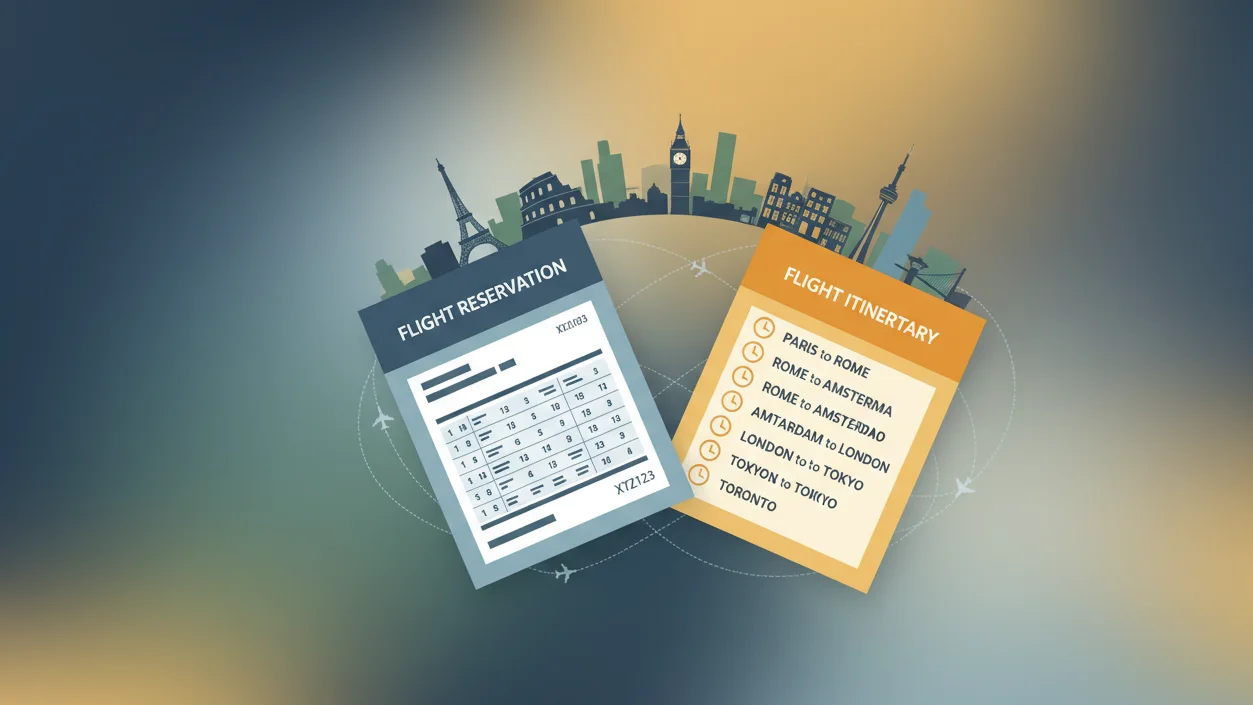Is A Flight Reservation Enough for Your UAE Work Visa? Here’s the Smart Way to Do It
You finally have a UAE job offer, the family in India is excited, and HR is asking for your “expected travel date.” At the same time, friends warn you not to buy a non-refundable ticket until the visa is stamped. Somewhere in between sits the question: will a flight reservation work for a UAE work visa, or can it create problems later? A dummy ticket offers a smart, verifiable alternative to lock in dates without full commitment, ensuring flexibility during approvals.
In this guide, we walk through the process like seasoned travelers who have seen the common mistakes. We look at when UAE authorities care about your flight details, how employers in different emirates handle travel plans, and how you can use reservations smartly without burning your savings. For more visa tips, check our FAQ. By the end, you will know when to book, when to wait, and how to keep your plans flexible. Explore related insights in our blogs. Get your UAE work visa plans sorted with a quick dummy ticket booking today. Learn about our team's expertise on the About Us page.
Yes — a flight reservation for UAE work visa is commonly used by applicants as proof of intended travel during the initial processing stage. While UAE immigration does not require a fully paid ticket before approval, they do expect a credible, verifiable itinerary that matches your employment contract and entry permit dates. A real PNR flight reservation from BookForVisa.com helps demonstrate preparedness, reduces timeline discrepancies, and supports both company-sponsored applications and personal submissions through VFS Global or Tasheel. It’s the safest way to meet documentation expectations without buying an expensive ticket upfront.
Last updated: November 2025 — aligned with current UAE Work Visa, Entry Permit, and Residence Visa procedures.
Table of Contents
So, Can You Actually Use A Flight Reservation For A UAE Work Visa?
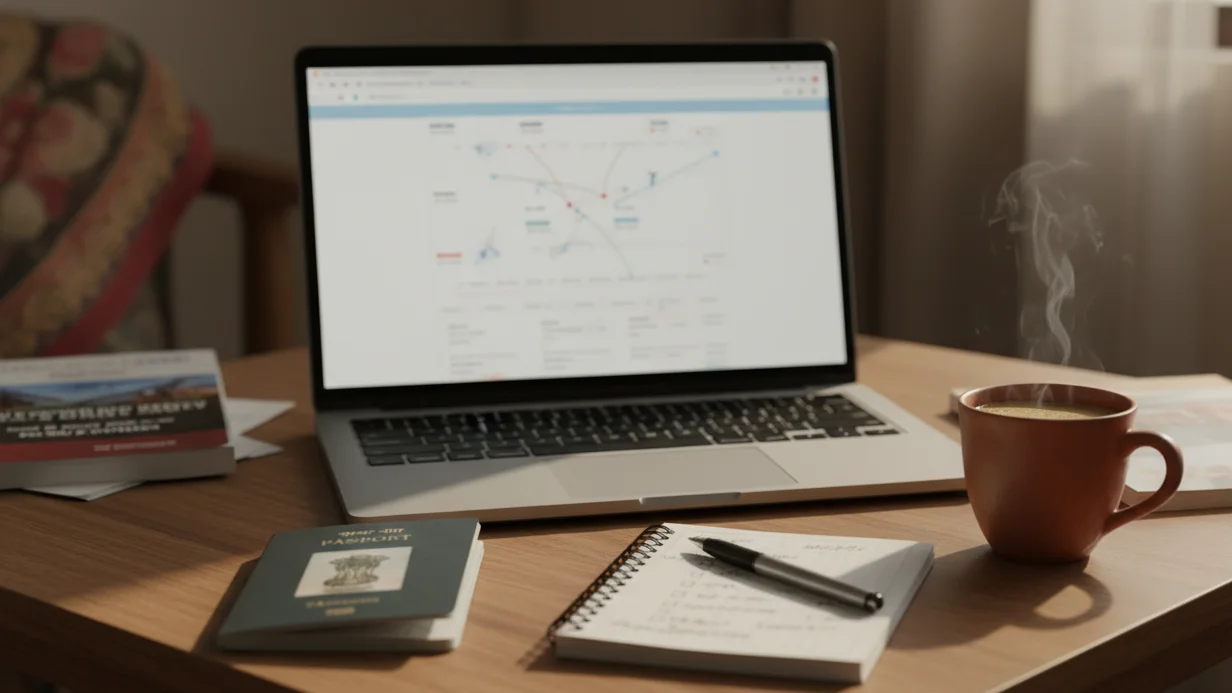
You are caught in the classic work visa tug of war. HR wants a joining date. Your travel agent wants you to pay for a full ticket. Your family wants to book everyone’s leave for your farewell. Somewhere inside all that noise is a simple question: Will a flight reservation be enough for your UAE work visa journey, or do you really need a fully paid ticket?
Let us unpack this calmly so you can protect both your visa and your wallet. Before you lock in a non-refundable fare, safely book a dummy ticket that matches your tentative joining date.
Start With The Real Question: Who Actually Cares About Your Ticket?
When we talk about a UAE work visa, there are a few different people involved in your journey from India:
- Your UAE employer and their HR or PRO
- UAE immigration and labor authorities
- Indian emigration and airport staff
- The airline that will fly you out
Each of them cares about different things.
UAE immigration and labor departments are focused on your employment being genuine. They want to see approvals, contracts, and valid documents. Your flight ticket is usually not what decides your work visa approval. For airline verification tips, see IATA guidelines.
Your employer or PRO may ask for your expected travel date. Sometimes they ask for a tentative booking or itinerary so they can plan your onboarding, accommodation, and transport from the airport.
Airlines and Indian airport staff might check if your travel story makes sense. If you travel on a tourist visa, they may ask for proof of return. With a work entry permit or residence visa, they mostly care that your documents match your intent to work.
So, the direct answer is simple: for a UAE work visa, a flight reservation is usually a planning tool, not the main approval condition. The confusion starts when tourist visa habits get mixed into work visa conversations.
Why Tourist Visa Rules Confuse Work Visa Applicants
If you have ever traveled on a tourist or visit visa, you already know how obsessed airlines and some consulates are with return tickets. Many people in India are used to being told:
- "You must show a return ticket to prove you will come back."
- "Your visa will not be processed unless you attach a full itinerary."
This thinking then travels into work visa discussions. Friends, relatives, and even some travel agents assume the same logic applies.
In reality, a work visa is different. You are not going for a quick holiday. You are going to live and work for a UAE company that has sponsored you. The entire system is built around:
- Your employer’s trade license
- Your job offer and contract
- Approvals from the UAE labor and immigration authorities
Yes, you will eventually need to fly. But the immigration decision is not usually based on whether you booked a specific flight on a specific date.
Where A Flight Reservation May Be Requested During The Process
Even though the visa itself does not normally depend on a paid ticket, your travel dates do show up in several parts of the journey.
Here is where you might be asked for travel details or a reservation:
- Entry permit stage
Your employer applies for your work entry permit while you are still in India. The application may include an expected arrival date. This is often just an estimate. Some employers ask you to share a tentative travel plan so they can fill in realistic dates. A simple reservation or proposed itinerary usually works. - Visa stamping or status change
In many cases, Indian workers now travel to the UAE with an electronic entry permit, then complete medicals, Emirates ID, and residence stamping after arrival. Where stamping is done before travel or a status change happens inside the UAE, HR may align dates with your likely arrival. Again, they usually need dates, not necessarily a fully paid ticket. - Company onboarding and accommodation planning
HR teams often want your travel date to book staff accommodation, transportation, and induction schedules. A reservation with realistic timings helps everyone stay on the same page. - Airline check-in in India
At departure, airline staff may ask basic questions. If your documents are in order and you carry a valid work entry permit or residence visa, they normally do not demand proof of return. A one-way ticket or reservation often matches your purpose of travel.
The key point is this: travel details are used for coordination and logistics. They are rarely the main legal requirement for the visa itself.
Common Myths In India About Tickets And UAE Work Visas
Across India, you hear the same lines repeated in different languages, especially in WhatsApp groups and tea shop discussions. Let us tackle a few of them directly.
Myth 1: "Your work visa will be refused if you do not attach a confirmed ticket."
Most UAE work visa systems are designed so that the employer in the UAE handles the application. They often submit your passport copy, photos, contract, and approvals. Ticket details are not the make-or-break factor. What matters is whether the job, sponsor, and documents are genuine.
Myth 2: "Ticket date must match your joining date exactly or the visa is cancelled."
In practice, joining dates move all the time. Projects get delayed. Candidates have notice periods in India. Flights are rescheduled. Employers understand this. A small difference between the ticket date and the original proposed joining date rarely causes any issue, as long as your entry permit is valid and you keep HR informed.
Myth 3: "Without a return ticket, immigration will think you will overstay."
For a tourist visa, this fear has some logic. For a work visa, your right to stay is linked to your residence permit, not a return ticket. UAE authorities expect you to live and work there for the length of your contract. A return ticket is not the main proof of your intention.
Myth 4: "If you do not buy the ticket from a particular agent, your visa will not come."
This is a red flag, not a rule. Genuine employers do not force you to buy non-refundable tickets from specific shops as a condition for processing your visa. When you hear this, take a step back and check how legitimate the arrangement really is.
Once you clear these myths, you start seeing flight reservations for what they truly are: useful tools, but not magical keys that control your entire visa destiny.
When A Flight Reservation Actually Helps You
Now that we have cut through the myths, let us talk about the smart, practical side. There are genuine situations where a flight reservation helps you.
A reservation can be useful when:
- Your employer wants to lock a tentative joining window
Instead of arguing about dates, you can send a realistic itinerary and ask, "Will this week work for you?" It makes the conversation concrete. - You need to show travel intent without paying the full fare yet
Maybe you trust the employer, but still want to protect your savings until the entry permit is in your inbox. A reservation lets you share travel details now and pay the full amount later. - You are coordinating two big moves at once
For example, you resign from your current job in India and relocate to the UAE. A reservation helps you plan notice periods, house shifting, and family responsibilities. - You want backup at check-in
Even with a work entry permit, some travellers feel more confident showing a neat itinerary if questions arise at the airport.
In all these cases, the reservation supports your planning and communication. It is not there to replace proper documents or to impress immigration with something flashy. It just makes your plan visible and workable.
The Real Priority: Solid Documents First, Flight Decisions Second
When you are excited about a new job abroad, it is tempting to handle everything together. Ticket, packing, notice period, farewell party. The risk is that you spend big on flights while your paperwork is still moving.
A better order is simple and safe:
- Focus on your core documents
- Offer letter and contract
- Attested certificates were required
- Passport validity
- Entry permit or visa approval from the UAE
- Confirm the seriousness of your employer
- Clear written communication
- Company details you can verify
- Transparent explanation of the process
- Use flight reservations to keep travel flexible
- Share possible dates
- Adjust as approvals progress
- Commit to a paid ticket only when dates are realistic
If you follow this order, a flight reservation becomes a smart tool rather than a stressful expense. You stay in control, and you reduce the chance of losing money because of last-minute changes.
Tracing Your UAE Work Visa Journey From India
Before you think about flight reservations, it helps to see the full picture of how a UAE work visa actually moves from "job offer" on your phone to "residence visa" in your passport. Once you see the timeline clearly, you will instantly know where flights fit in and where they really do not.
Let us walk through this journey as if we are planning it together, from the day you get the offer to the day you start work in the UAE. Share confirmed travel plans with HR using a hassle-free dummy ticket booking instead of risking expensive changes.
From Job Offer To That All-Important Entry Permit
Things start long before you pack your bags. The real journey begins the moment a UAE company says yes to hiring you.
First, you receive a job offer by email or through a recruiter. Sometimes it is a simple offer letter. Sometimes it already looks like a full contract. Before you rush ahead, you should:
- Check the company name exactly as written
- Confirm the job title and basic salary
- Read the benefits, accommodation, and transport details
Once you sign and return the offer or contract, your employer becomes your sponsor. In UAE terms, that means they are responsible for applying for your work permit and residence visa.
From your side in India, you usually provide:
- A clear passport scan with enough validity left
- Passport-size photos as per UAE spec
- Scans of your degree or diploma, if the job needs it
- Any professional registrations for specific roles
While you continue your current job or notice period here, most of the action shifts to the UAE side. The company starts preparing your file with the right authorities. At this stage, you do not need a flight ticket. What matters is that your documents are correct and readable.
What Your Employer And PRO Are Doing Behind The Scenes
Inside the UAE, your employer works with labor and immigration systems that you do not see directly. Many companies have a Public Relations Officer (PRO) who handles the paperwork. Others rely on typing centers or external agents.
Behind the scenes, they typically:
- Make sure the company's trade license and establishment card are valid
- Check if they have a quota to hire a foreign worker in your role
- Submit your details for labor approval where MOHRE applies
- Upload your passport and contract to the government portals
If everything is in order, the authorities issue a work entry permit for you. This is usually an electronic document that shows:
- Your name and passport number
- Your sponsor details
- The type of visa
- A time window in which you must enter the UAE
For most Indian applicants, this entry permit is the real turning point. Before this stage, tickets and flight reservations are just wishful thinking. After this stage, travel dates become meaningful.
At this point, your employer or HR usually emails you the entry permit and starts talking more seriously about your joining date. Now, we are getting closer to where a flight reservation actually matters.
Where Your Travel Date Starts To Matter In The Timeline
Once your entry permit is issued, your visa journey moves from "paperwork" mode to "planning" mode.
This is when HR normally asks questions such as:
- "When can you finish your notice period in India?"
- "Which week can you travel to the UAE?"
- "Are there any personal commitments we should be aware of?"
You also have your own questions to balance:
- When will you receive your final salary and relieving letter?
- When can you hand over responsibilities at your current job?
- Do you need time to move house or settle family matters in India?
At this stage, many Indian candidates use a flight reservation instead of locking in a full ticket.
A reservation helps you:
- Share a realistic travel date with HR
- Check if the timing matches their onboarding schedule
- Adjust the dates if there is a delay with your notice period or entry permit
The idea is simple. We use the reservation as a planning tool, not as a gamble with your savings. You and the employer see the same date on the screen, then confirm if it works.
You only need to be careful about one thing here: your entry permit validity window. You must plan your travel within that period. If your reservation is outside that window, you are only creating more confusion.
Your First Days In The UAE After You Land
Once you actually travel to the UAE using your entry permit, the focus shifts again. The game is no longer about "Will the visa come?" but about completing the remaining steps correctly and on time.
In your first days and weeks after landing, you usually go through:
- Medical test
You visit an approved medical center for blood tests and a chest X-ray. The aim is to clear you medically for residence. - Emirates ID application and biometrics
You submit your Emirates ID form and do fingerprints, and a photo at an official center. This ID becomes your main identity document in the UAE. - Residence visa stamping on your passport
Once medical and ID steps are cleared, immigration places a residence sticker or stamp on your passport or updates the residence visa electronically.
During this time, your main job is to follow your employer’s instructions. They will tell you when and where to go, and often a company PRO will accompany you or at least guide you.
Your flight reservation or ticket has already done its work by this point. Immigration now cares more about your tests, biometrics, and approvals than about how you arrived.
Why Work Visa Steps Feel Messy When You Sit In India
Sitting in India, it is easy to feel that nothing is moving. You may not see the internal approvals. You only see the final output: the entry permit in your inbox.
This gap in visibility creates confusion around flights. Families are excited. Employers are busy. Agents keep calling. That is when you hear mixed signals like:
- "Book fast, ticket prices are going up."
- "Do not book anything until the visa is stamped."
- "Just make a random booking and see what happens."
We prefer a calmer approach.
If you know the sequence clearly:
- Job offer and contract
- Employer approvals and entry permit
- Travel planning and actual flight
- Medical, Emirates ID, and residence stamping
You can place each decision in the right step.
You do not need a ticket to start the process. You do not need a ticket for your employer to apply. You only need a sensible travel plan once the entry permit is ready and both sides have clarity about your joining date.
How This Timeline Helps You Use Flight Reservations Smartly
When you understand the visa journey, a flight reservation becomes a strategic tool rather than a panic purchase.
Here is how you can use it sensibly:
- Before entry permit approval
Avoid paying for anything. You can check prices and routes, but keep your wallet closed. If someone pressures you to buy, treat it as a warning sign. - After entry permit approval but before firm joining confirmation
Use a reservation to suggest a realistic travel date to your employer. Ask, "Can we fix my joining around this date?" If they say there might be delays, you know you should hold off on buying a full ticket. - After employer confirms your joining date in writing
Now you can shift from a reservation to a confirmed ticket. You still may want a fare that allows some changes, but you no longer feel like you are guessing blindly. - If anything changes last minute
Because you understood the stages, you will not be shocked. You can adjust your reservation or move your paid ticket within the airline's rules, and you will know exactly which step caused the delay.
The whole point of mapping the journey is to give you control. You stop reacting emotionally and start acting like a traveler who knows the system.
Your UAE Work Visa Checklist: Where Do Flights Really Fit In?
By now, you know the visa process is driven more by paperwork than by planes. Still, it helps to see the actual checklist laid out clearly, so you can stop worrying about the wrong things.
Think of this section as your filter. We separate documents that truly matter for a UAE work visa from things that are nice to have, like a flight reservation, but are rarely the star of the show. If your employer asks for flight details, simply book a dummy ticket and send them a clean, verifiable itinerary.
The Non-Negotiables: Documents You Must Get Right In India
Before anyone in the UAE even talks about your travel dates, your personal documents must be clean and complete. This is where many Indian applicants lose time.
Start with your passport.
Most employers and authorities expect:
- At least six months' validity from your intended date of entry
- Enough blank pages for stamps and possible future visas
- No serious damage, watermarks, or torn lamination
If your passport is close to expiry, it is smarter to renew it before the process gathers speed. Otherwise, you risk redoing approvals later.
Next comes your photograph. It looks simple, but rejections often happen because of a casual photo.
Make sure your photos are:
- Recent, not from your cousin’s wedding three years ago
- With a plain background, usually white
- Matching the size your employer or agent specifies
Then we have education and professional documents, which are crucial for skilled roles.
For many white collar jobs, employers expect:
- Degree or diploma copies
- Mark sheets, if requested
- Professional registrations for regulated fields, like nurses, doctors, engineers, and teachers
For a lot of mid to high-level positions, these need attestation. That means:
- State HRD or university-level verification in India
- Ministry of External Affairs (MEA) stamp
- UAE Embassy or Consulate attestation
This attestation takes time, so planning ahead is important. If you get this step right, your future promotions and role changes in the UAE will also become easier.
On top of this, some roles may require a Police Clearance Certificate (PCC), especially if the employer or visa category asks for it. Many Indian applicants apply for a PCC through Passport Seva or local police routes, depending on the employer’s instructions.
Notice something so far. You have not had to show a ticket. The priority is clear: valid identity and education proof.
The Employer’s Paper Trail: What Your Sponsor Must Provide
While you are busy gathering your documents in India, your employer is doing their own documentation dance inside the UAE. Your visa depends as much on their papers as on yours.
The company typically needs:
- A valid trade license, matching the activity for which they are hiring you
- An establishment card, which allows them to sponsor employees
- Proof that their company file is active with immigration and labor authorities
For your specific role, they also need:
- An employment contract or offer registered with the labor system or a free zone
- Approval of quota or position, depending on the authority
- Sometimes, copies of your certificates are uploaded to the relevant portals
All this gets tied together when they apply for:
- Labor approval, if MOHRE is involved
- A work entry permit or employment visa approval from immigration
This is where many Indian applicants feel tempted to book flights too early. A recruiter says, "Your visa is being processed, buy the ticket now." Our view is simple. Until the entry permit is issued and shared with you, a ticket is just a financial risk.
Even at this stage, you may be asked for an expected travel date, but that is different from being legally forced to own a paid ticket.
Health Checks, Emirates ID, And Residence Stamping: The Final Pieces
Once your entry permit is out and you either travel to the UAE or complete a status change from within, the process moves into the finishing phase.
Here, three things usually stand out:
1. Medical screening
You attend an approved medical center. Typical checks include:
- Blood tests
- Chest X-ray
The aim is to confirm you are medically fit for residence. If there are any issues, the employer and authorities will guide the next steps. Your earlier flight choice does not affect this stage.
2. Emirates ID registration
You complete an application for the Emirates ID, then visit a service center for:
- Biometrics
- Photograph
- Signature
This ID becomes your primary identification tool in the UAE. It is needed for everything from banking to housing.
3. Residence visa stamping or activation
Once medical and ID steps are cleared, immigration:
- Stamps your passport with a residence visa, or
- Activates an electronic residence visa linked to your Emirates ID
At this point, your work visa journey is basically complete. You are now a legal resident employee, not just a visitor.
Again, flights do not decide success here. The visa system cares about your fitness, your sponsor’s validity, and the paperwork trail. Your earlier flight reservation or ticket is simply the method you used to reach the UAE within your entry permit window.
Where Travel Bookings Actually Show Up In The Paperwork
Let us now zoom in on the part you care about most. Where do flights and reservations really appear in the paperwork, if at all?
There are a few touchpoints:
- Expected date of arrival fields
Some forms your employer fills out ask for an estimated date. This is often for planning, not a hard legal promise. A flight reservation can help your employer choose a realistic date. - HR and onboarding planning
For corporate roles, HR may schedule induction sessions, training, and accommodation based on your planned arrival. They might say, "Send us your travel plan." A booking or reservation makes communication smoother. - Recruiting agencies in India
If you are going through an agency, they might coordinate travel for several workers at once. They often like to see tentative itineraries, so they can group departures or arrange airport pickups. - Airport and airline interactions
At the Indian airport, airline staff may ask questions like, "When do you plan to return?" if your documents are unclear. With a work entry permit, your one way trip usually makes sense. Still, having a clean itinerary can sometimes make discussions faster.
In all these cases, what people mostly need is information, not a non-refundable ticket. They want to know when you are likely to land, which flight you are looking at, and whether it lines up with approvals.
When Ticket Demands Turn Into Red Flags
Now comes the part where you protect yourself. Not every request for a ticket or reservation is harmless. Some are practical. Others are pressure tactics.
Be careful when you see:
- Demands for a full, non-refundable ticket before entry permit approval
If the visa can still be rejected or delayed, paying for a rigid ticket puts all the risk on you. A serious employer understands that. - Insistence that you must buy from one specific travel agent at a high price
This is often a sign that someone is earning commission on your ticket. Your employment should not depend on where you buy your flight. - Threats that your job offer will be cancelled if you do not book immediately
Real companies usually plan timelines with some buffer. If everything is always "today or never," you need to ask why. - No written proof of your job, salary, or visa process, but constant talk about tickets
If they can write prices on WhatsApp but not send a proper offer letter, something is off.
In situations like these, the problem is not the concept of flight reservations. The problem is imbalance. All the risk is being pushed onto you before the legal foundation of your employment is secure.
A healthy process feels different. You receive a clear offer. You see your entry permit. HR coordinates dates with you. Any talk about flights fits naturally into that flow.
When you understand which documents sit at the heart of the UAE work visa, it becomes easier to ignore noise and focus on what truly matters. In the next section, we will look at how experiences differ across emirates, free zones, and consulates, and why one friend’s story should not dictate your entire travel plan.
One UAE, Many Playbooks: Why Ticket Rules Feel Different Everywhere
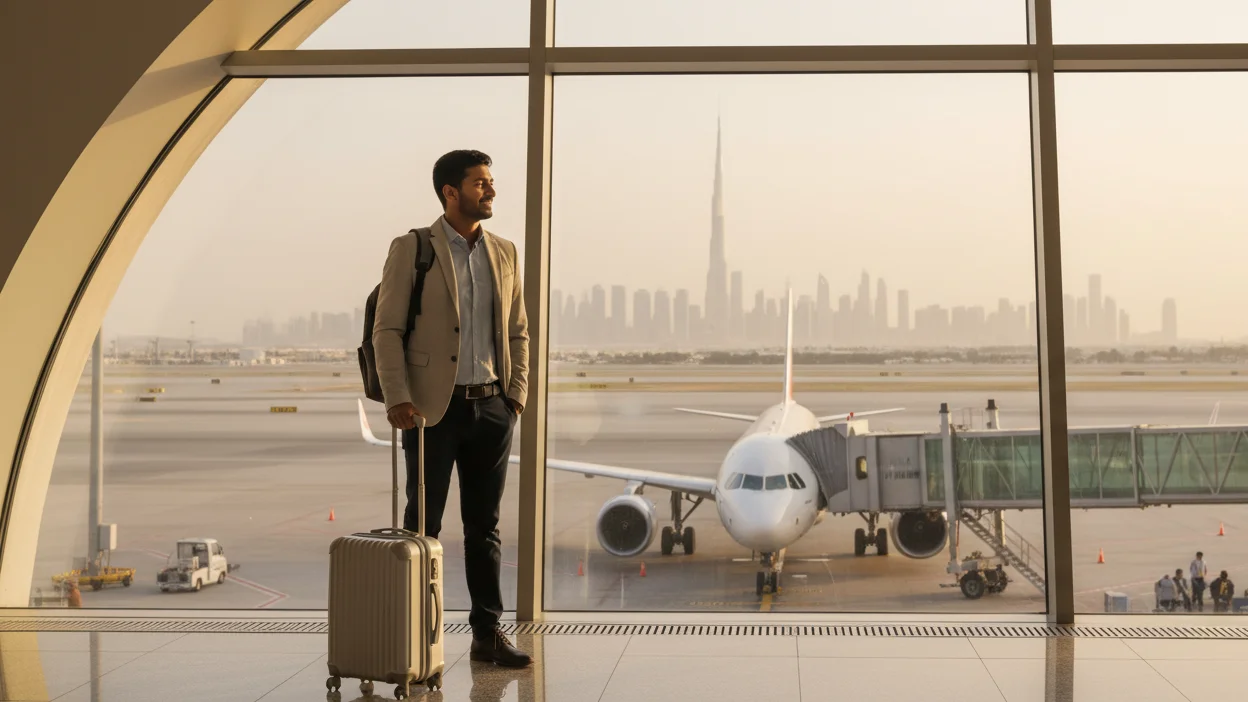
If you listen to five different people who went to the UAE from India, you will hear five different stories. One says Dubai immigration wanted nothing. Another says the agency in Kochi forced a ticket first. Someone from Abu Dhabi had the company arrange everything.
It feels messy until you understand one simple point. You are dealing with the same country, but different authorities, employers, and systems with their own habits.
Let us break this down so you can stop getting confused by everyone else’s version of “how it works.” Protect your savings while your visa is in process by choosing a flexible dummy ticket booking instead of a full-priced ticket.
Dubai, Abu Dhabi, Sharjah: Same Country, Different Style
When most Indian applicants say “UAE,” they secretly mean “Dubai.” Your cousin in IT talks about Dubai. Your neighbor working in hospitality also landed in Dubai. Naturally, their experience becomes the default story in your head.
In reality, each major emirate has its own flavor.
In Dubai, many companies:
- Have structured HR teams
- Use established PROs who work with GDRFA Dubai daily
- Follow clear internal joining procedures
In Abu Dhabi, you find:
- Large government and semi-government employers
- Oil and gas, aviation, healthcare, and education roles
- More formal onboarding programs for many positions
Sharjah, Ajman, Ras Al Khaimah, Fujairah, and Umm Al Quwain often:
- Focus heavily on manufacturing, logistics, construction, and SME businesses
- Rely more on external agents and typing centers
- Use a mix of formal and informal communication styles
Now connect this to flight bookings.
In big corporations in Dubai or Abu Dhabi, HR may:
- Share a visa copy
- Confirm your joining date
- Book your ticket yourself or reimburse you later
In smaller firms or industrial areas, employers may say:
- “You arrange the ticket and just come by this date.”
- “Send us your tentative booking so we know when to expect you.”
The country is the same. The law is similar. The style changes.
So one person is told never to worry about tickets until HR sends a confirmed itinerary. Another is told to send a reservation as soon as the entry permit is approved. Both stories are true in their context.
Mainland Vs Free Zones: How Your Work Location Shapes The Process
On top of emirate differences, you have a second layer. Some companies are on the mainland, under the Ministry of Human Resources and Emiratisation, and the local immigration department. Others are in free zones, which run their own immigration and licensing systems.
If you join a mainland company, your process typically involves:
- MOHRE for labor approvals
- The local GDRFA or equivalent for visa issuing
- Standardized work permit and residence visa flows
Mainland HR teams often talk more about:
- Labor contract registration
- Local labor law rules
- Internal policies around notice periods and joining dates
If you join a free zone company, you might deal with authorities like:
- JAFZA (Jebel Ali Free Zone)
- DMCC (Dubai Multi Commodities Centre)
- DIFC, ADGM, or other specialized zones
Free zones often have:
- Their own online portals for visas
- Slightly different document formats
- Dedicated customer centers where PROs submit everything
Here is how that can affect your flight situation.
Some free zones and mainland setups prefer:
- To complete as much approval as possible before you travel
- To give you a fixed joining date once the entry permit is clear
- To send you an official email with “Please book your ticket for this week”
Others are more relaxed and say:
- “Your visa is approved; come within this 30/60-day window.”
- “Just let us know your flight details once you book.”
In both cases, the legal base is the same: entry permit + sponsor + paperwork. The flexibility around travel is what changes.
For you, this means one important thing. Never assume that the way your friend’s free zone company handled flights is exactly how your mainland employer will handle them, or the other way round. Your planning should follow your own sponsor’s system, not someone else’s story.
Where Indian Authorities And Emigration Fit Into The Picture
Alongside UAE systems, you also pass through Indian checks before departure. That is another place where stories about tickets can get confusing.
For certain categories of Indian workers, especially in specific job roles and salary bands, the eMigrate system and the Protector of Emigrants (PoE) come into play. This is especially relevant for blue-collar roles and jobs that fall under “emigration check required” (ECR) categories.
In these cases, Indian authorities care about:
- A valid employment contract
- A proper work visa or entry permit
- Employer details, including address and contact
Sometimes, agents or recruiting agencies coordinate directly with PoE and airlines to move groups of workers together. In such group movements, agencies may:
- Block seats in advance
- Ask you to confirm if you are ready to travel with that batch
- Request a reservation or itinerary to align with others
At the airport itself, Indian emigration officers and airline staff may ask questions if they see:
- Mismatched information between your visa, ticket, and purpose
- Unclear employment details or incomplete documents
- First-time travelers with unusual travel patterns
A clear, sensible itinerary often helps your overall story match. That does not mean the system is officially demanding a non-refundable ticket months in advance. It just means your travel plan should align with your visa and contract.
Understanding this helps you respond calmly when an agent claims, “PoE will not allow you to go without buying this ticket from us.” Many times, what PoE or emigration truly wants is correct documentation, not a ticket from a specific shop.
Recruitment Agencies, Sub-Agents, And Their Ticket Habits
If you are going to the UAE through a recruitment agency in India, your experience with tickets may feel very different from someone hired directly by a corporation.
Licensed agencies handle:
- Campaigns for hospitals, hotels, oil and gas companies, and construction firms
- Bulk hiring and group departures
- Coordination of medicals, PCC, and visa stamping
Because they move candidates in batches, agencies often:
- Plan specific departure dates for a whole group
- Work with selected airlines for better fares or schedules
- Ask everyone to confirm readiness for a particular flight window
So it is common to hear:
- “We will book all of you on this date.”
- “Here is the tentative flight plan. Confirm your availability.”
This can be normal coordination. The problem starts when:
- The agency pressures you to pay for an expensive ticket before your entry permit is fully approved
- A sub-agent adds their own margin and gives you no written breakdown
- You are not allowed to compare ticket prices or choose airlines once the visa is ready
In healthy setups, you usually see:
- Clear separation between recruitment fees (if any) and ticket costs
- Written communication about who bears the travel expense
- Flexibility to adjust dates if the company changes the joining schedule
In unhealthy setups, tickets become a tool to squeeze candidates. Everything is urgent. Everything is “last chance.” You hear more about fares than about your actual job.
Knowing this difference helps you judge the situation. You can respect genuine coordination needs without falling into the trap of unnecessary ticket pressure.
Why Your Cousin’s Story Should Not Dictate Your Travel Plan
Given all these moving parts, it is no surprise that experiences vary wildly.
You will hear:
- One friend whose Dubai IT employer booked his flight after sending the entry permit
- Another relative in Sharjah who bought a ticket on his own after visa approval
- A nurse who went to Abu Dhabi through a recruitment agency that handled visas and flights together
All these stories live in your head when you make your decisions. If you are not careful, they create panic.
The smarter approach is simple.
When planning your own UAE move, focus on:
- Your employer type
Are you joining a big corporate, a free zone company, a mainland SME, or going through a recruitment agency? - Your official documents
Do you have a clear offer, a visa copy, and written joining instructions? - Your communication channels
Are you in direct touch with HR or PRO, or only with unverified sub-agents?
Then use other people’s experiences as reference points, not as strict rules. Your cousin’s Dubai journey can give you clues. It cannot replace your own checklist.
If your sponsor says, “We only need your expected date, you can book closer to the time,” trust that process. If they say, “Please share your provisional booking for this week,” you can use a reservation to respond without locking in heavy costs.
When you understand how emirates, free zones, consulates, and agencies all shape the experience, flight reservations stop looking like a mystery requirement. They become one more tool in your planning kit.
Playing It Smart With Flight Reservations While Your UAE Visa Is In Motion
By this point, you already know one thing clearly: your move to the united arab emirates is powered by approvals and paperwork, not by who books the fastest ticket.
Now the real question is how you use a flight reservation as a smart tool, so you do not lose money, upset HR, or delay your chance to legally work under proper employer sponsorship. When timelines are still shifting, book a dummy ticket and keep your travel plans adaptable. 👉 Order your dummy ticket today.
Why Booking A Non Refundable Ticket Too Soon Can Backfire
It is very tempting to lock in a cheap fare the moment you hear that your work visa application is “under process.” Prices look low, your family members are excited, and a travel agent talks about rising fares as if there is a strict age limit on good deals.
The problem is simple. Airline systems do not follow the visa requirements of the UAE Ministry or any foreign affairs department. Your journey is tied to government approvals, and those rarely move at the same speed as price alerts.
Several real situations cause delays for indian nationals:
- Internal approvals in the foreign company that has hired you
- Extra checks on the documents required from your side
- Slow responses from an embassy or UAE consulate involved in attestation
- Personal issues in India, such as notice periods or health certificate delays
Now imagine you buy a non-refundable ticket for a specified period in June.
Then:
- Your entry permit is late because the application process took longer than the original processing time.
- Your current employer in India refuses to release you early.
- Your medical examination throws up a small issue, and you must repeat a test before getting a clean report.
In all these cases, the ticket sits there like a problem. To change it, you face associated costs in the form of rebooking fees, fare differences, or even no-show penalties.
This is how many indian professionals burn part of the savings they hoped to enjoy as tax-free income in a city like Dubai. A little patience with tickets can protect that money for better things, like rent, health insurance, or school fees later.
Matching Your Reservation To A Realistic Visa Timeline
A reservation lets you walk the middle path. You show that you are serious about travelling, without dropping a big amount before the required documents are fully cleared.
To use it properly, connect it to clear stages in your journey as a foreign national heading to work in the united arab emirates.
Think in three phases.
Phase 1: Before entry permit approval
Here, everything is still intact.
- You have an offer for a Dubai work visa or another visa type.
- Your employer submits the application form and other papers online.
- You provide a valid passport, photos, and educational proof.
At this stage, you should:
- Track fares and routes.
- Compare airlines and baggage limits.
- Avoid paying for any ticket or long hold.
A flight reservation now is mostly guesswork. The risk is entirely on you, and no world-class infrastructure or multicultural environment will compensate for wasted money.
Phase 2: Entry permit approved, joining date still flexible
Now life becomes more concrete.
- You receive the official approval based on the following documents and checks.
- HR wants to know when you can land.
- You finish your notice period and personal commitments.
Here, a reservation makes sense. You can:
- Pick a realistic week to travel as one of many skilled professionals heading out.
- Create a reservation for a specific date in that week.
- Share the itinerary on company letterhead or by email and ask if that timing works.
If they say the date works, good. If they say “we might need one more week,” you adjust the reservation instead of paying change fees on a full fare.
Phase 3: Joining date confirmed in writing
Finally, you reach clarity.
- Employer confirms your reporting date and any initial document requirements.
- You know when you leave your current role.
- You have enough time to arrange travel insurance and packing.
Now you switch from a reservation to a paid ticket. You still may choose a flexible fare, but you are booking with solid information instead of hope.
This phased thinking works whether you go on a standard work visa, green visa, or even later aim for golden visa options. Each travel decision matches the certainty level in your file.
How Indian Workers Usually Use Reservations In The Real World
If you speak to enough indian professionals who moved to Dubai for work, you will notice a familiar rhythm, no matter which foreign company hired them.
Most do not rush into tickets at the moment of the offer. They:
- Wait for the main visa application to be approved by the relevant authority.
- Watch how long the above steps actually take instead of trusting random guesses.
- Look at two or three possible dates that fit their notice period and family sponsorship plans.
- Use a reservation to open a clear conversation with HR about the final travel window.
Sometimes the reservation moves once or twice:
- A medical examination needs to be repeated before Emirates ID issuance.
- School exams for children or other family members change.
- The company shifts the onboarding batch for qualified professionals by a week.
Because they used a reservation at this stage, they do not lose money every time the date moves. The paid ticket comes later, once both sides agree that the timing is stable for at least a limited period.
This is the calm, steady style that protects you from panic bookings and still keeps you on track for your Dubai work plans.
Using A Verifiable Reservation As Your Safety Net
There is one specific challenge you may face in India.
Sometimes HR, a recruiter, or even a checklist from an office of foreign affairs asks you for:
- “Flight details”
- “Booking copy with PNR”
- “Travel plan attached to your visa application form.”
They want proof that you have a realistic travel plan, not just a vague promise written next to the document requirements.
At the same time, you may not be ready to spend on a full ticket while the work visa application is still fresh.
In those situations, a verifiable reservation becomes your safety net. Instead of editing fake PDFs or inventing reference numbers, you use a real system booking that airlines can see.
That way:
- Employers can confirm that you plan to arrive within the specified period on your entry permit.
- Any office or UAE consulate that chooses to check the reference finds a real booking.
- You avoid risk around fraud, which can be serious for foreign nationals.
Services like BookForVisa.com exist exactly for these scenarios. They give indian nationals a live, checkable reservation for a small fee, which is often cheaper than the associated costs of changing a full ticket many times. For indian professionals with multiple clients, complex notice periods, or family sponsorship plans, that flexibility can be the difference between tidy planning and financial stress.
Keeping HR, Your Family, And Your Wallet In Sync
The hardest part of this journey is not always the visa itself. It is the people side.
Your employer wants a date.
Your family wants a date.
The airline system wants a date.
You are standing in the middle, trying to make sure all the document requirements are met and that nothing clashes.
A simple structure helps.
- With HR or PRO, you:
- Share a realistic window based on the entry permit validity.
- Use a reservation to show serious intent to work in the united arab emirates under a foreign company or uae citizen sponsor.
- Ask for any changes in writing, so you can reschedule flights and review travel insurance calmly.
- With your family, you:
- Explain that the plan is for a limited period until things settle, then you may invite them later if family sponsorship becomes an option.
- Avoid announcing a big farewell until the main required documents are cleared.
- Keep a few buffer days so unexpected issues with a health certificate or similar do not create drama.
- With your own budget, you:
- Reserve money for tickets and basic setup instead of spending it on rushed flights.
- Choose a timing that fits the visa type and any age limit or category rules that apply to foreign nationals or exceptional talents.
- Remember that many who start on a standard work visa later explore long-term residency routes if their career grows.
Handled this way, your reservation supports the bigger plan. It respects the documents required by the authorities, the needs of HR, and the emotional reality at home.
You are not the person who books three flights because plans keep changing. You are the person who watched the processing time carefully, used reservations strategically, and moved to the united arab emirates with clarity and confidence.
How To Safely Use A Flight Reservation For Your UAE Work Visa
By this stage of your planning, you already know a ticket can either protect your plans or burn your savings. The trick is not just whether you book, but how and when you use a reservation so everything stays flexible while your visa moves forward.
Think of this section as your practical playbook. Together, we will treat flight reservations like tools, not emotional decisions or pressure tactics from agents.
What Exactly Counts As A Valid Flight Reservation?
Before you share any itinerary with HR or an embassy, it helps to know what a real reservation looks like in the system.
A valid reservation usually includes:
- Your full name exactly as on the passport
- A PNR or booking reference
- Airline name and flight numbers
- Origin and destination airports
- Travel dates and times
- Booking status, such as "On Hold" or "Reserved"
This is different from:
- A fully paid ticket, where the booking is "Ticketed"
- A fake PDF, where someone edits dates and names but there is no record in the airline system
HR, consulates, and airlines can often verify a PNR on the airline website or through their internal systems. Students, first-time applicants, and even digital nomads sometimes underestimate this. They share a neat-looking PDF that cannot be verified and then face awkward questions at the airport.
Our rule is simple. If you call the airline and they cannot find your booking, it is not a safe reservation to rely on.
Smart Ways To Get A Flight Reservation Without Locking In Too Soon
Once you know what a real reservation is, the next step is choosing how to get one that fits your situation.
You have a few solid options:
- Hold Directly With The Airline
Many airlines let you hold a booking for 12 to 72 hours without full payment. This works well if your visa is almost done and you only need a short window to confirm with HR or family. - Ask A Trusted Travel Agent
Traditional agents can place a booking on hold through their systems. This is useful if you are not comfortable booking online or you are in a smaller town where agents manage most travel. - Use A Dummy Ticket Or Reservation Service
Some online services create real, verifiable reservations for a limited time. They are popular with work visa applicants, students, and family visitors who need proof of travel for documents but are not ready to pay a full fare. - Book A Fully Refundable Or Flexible Ticket
If your budget allows, you can treat a flexible ticket like a "super reservation". You pay upfront, but you can change or cancel with less pain. Professionals with tight joining schedules or digital nomads with multiple trips often prefer this.
For most work visa applicants, a short-term reservation or dummy ticket is enough during the early stages. The fully paid ticket comes later.
Picking A Realistic Travel Window Instead Of Guessing
A reservation only helps if the dates are sensible. Too early or too late, and you start fighting your own paperwork.
When you choose dates, think about:
- Entry Permit Validity
Check the "valid until" date on your entry permit. Your arrival should fall comfortably inside that window. Do not plan to land on the very last day unless there is no other choice. - Notice Period And Handover
Align the flight with your last working day in your current job. Give yourself at least a few days between your final day and departure. You need time to pack, close bank work, and say proper goodbyes. - Family And Personal Commitments
Students waiting for final exams, parents managing school terms, and family visitors juggling weddings all need buffer time. It is easier to move a reservation than to untangle rushed commitments. - Peak Travel Seasons
Around Eid, New Year, and school holidays, flights fill fast. If your joining date lands in those weeks, plan your reservation a little earlier so you have options.
We want your travel window to feel calm, not like a race with the calendar.
Matching Your Reservation To Your Visa And Job Story
Your ticket should tell the same story as your visa and contract. If the story looks broken, people ask questions.
Keep things aligned by checking:
- Correct City And Airport
If your job is in Abu Dhabi but your reservation shows arrival in Ras Al Khaimah with no onward plan, it can look odd. Choose the airport that makes sense for where you will live and work. - Exact Name And Passport Details
Make sure your name, date of birth, and passport number on the reservation match your passport and visa documents. Even a small spelling error can slow you down at check-in. - Clear, Simple Routing
A straightforward route like Kochi to Dubai is easier to explain than a very long path through multiple countries. Digital nomads sometimes love complex routes, but for a first work entry it pays to keep things simple.
When your documents, job location, and reservation all match, you give immigration and airline staff less reason to probe.
Sharing Your Reservation With HR The Right Way
Once you have a solid reservation, you want HR or your agency to see you as organised and serious, not confused or nervous.
A clean way to share is:
- Download the reservation as a PDF or take a clear print-friendly copy
- Send a short, professional email instead of just a screenshot on chat
- Confirm that the dates are still flexible if they need any changes
For example, you might write:
- "Dear [Name], as discussed, please find attached my tentative travel plan for [date]. If the company prefers a different date within the entry permit validity, we can adjust this reservation accordingly."
This works well for first-time workers, students moving to internships, and even experienced professionals. It shows that you are proactive but also cooperative.
Mistakes To Avoid With Flight Reservations
Even smart travelers fall into the same traps. We see a few patterns over and over again.
Try to avoid:
- Using Fake Or Edited Itineraries
A made-up PDF may seem harmless, but if HR or an embassy checks and finds nothing in the airline system, it can damage trust. In the worst case, it can create legal trouble. - Choosing Dates Outside Your Visa Window
Booking for a date after your entry permit expires makes no sense. It only creates more calls, corrections, and confusion. - Ignoring Time Zones And Date Formats
Students and first-time travelers often mix up day and month formats. Always confirm if the date is written as DD/MM or MM/DD before sharing. - Letting Every Reservation Turn Into A Rush Decision
A reservation is meant to give you breathing space. If every hold pushes you into instant payment out of fear, step back and review the plan.
A bit of care here saves you money and stress later.
What To Do When Your Joining Date Moves
Visa processes and company plans can shift. The good news is that a reservation is designed for this kind of movement.
If your date changes and:
- You Only Have A Reservation Or Dummy Ticket
Simply request an updated itinerary for the new dates. Often there is no extra cost or only a small service fee. - You Already Bought A Ticket
Check the airline rules. You may be able to change dates by paying a change fee and any fare difference, or in some cases convert the ticket into a travel credit. - The Company Delays Onboarding
Ask HR to confirm the new reporting date in writing. Use that email to adjust your reservation so everything lines up again.
Digital nomads are used to this kind of flexibility. Work visa holders can borrow the same mindset, while still respecting visa validity and employer requests.
A Quick Checklist Before Turning A Reservation Into A Real Ticket
When everything starts to line up, it is tempting to hit "Pay Now" instantly. Before you do that, run through a short checklist.
Make sure:
- Your entry permit is issued and you have a copy
- Your joining date and location are confirmed in writing
- Your notice period, handover, and last salary in your current job are clear
- Any required medicals, PCC, or documentation in India are on track
- You know who is paying for the ticket and whether there is any reimbursement
- You are comfortable with the airline, baggage rules, and route
If most of these points are solid, it is usually safe to move from a dummy ticket or held booking to a paid ticket.
When we use reservations this way, they stop being a source of anxiety. They become exactly what they should be: flexible tools that support your UAE work visa journey instead of controlling it.
You can also add a few extra checks for real peace of mind:
Your first few days of stay are sorted, whether that is company accommodation, a hotel, or a relative’s place.
HR or your recruiter has your exact flight number and arrival time, so airport pickup or first day reporting is smooth.
Your layover rules are clear, especially if you transit through a country that may need a separate transit visa.
Your travel insurance is active for your travel dates, which is helpful for students, first-time flyers, and family visitors.
For digital nomads or remote workers converting to a UAE role, your devices, data backups, and bank cards are ready for international use.
For those planning to bring family later, you have a rough idea of school calendars and rent ranges so you do not need to rush them immediately.
Once you tick through this list, paying for the ticket feels like a calm decision, not a gamble. You know the paperwork is strong, the timing is realistic, and your first days in the UAE will be more about settling in than fixing avoidable mistakes.
Clear Your Visa First, Lock Flights Later
If you remember only one thing, let it be this: your UAE work journey is decided by solid documents and a genuine sponsor, not by how early you buy a ticket. Flight reservations are tools. Use them to coordinate dates, keep HR informed, and stay flexible while approvals move in the background.
When you are unsure, slow down, check the latest checklist, and talk openly with your employer or PRO. Plan your ticket only when the timeline is real, not imagined. Do that, and you protect your money, reduce stress for your family, and walk into your new job in the UAE confident and prepared. Stay ready for last-minute approvals with an instant dummy ticket booking you can update as your dates change.
What Travelers Are Saying
Why Travelers Trust BookForVisa.com
BookForVisa.com has been helping travelers like you since 2019, specializing exclusively in dummy ticket reservations for visa applications. We've supported over 50,000 visa applicants with secure, instant PDF delivery and 24/7 customer support from our dedicated team. As a registered business, BookForVisa.com ensures verifiable PNRs and unlimited changes, building trust through niche expertise in work and travel visas—no automated systems, just real assistance for your UAE journey.

